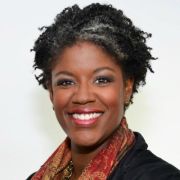Tools for Humanity: Rage and Love as Acts of Resistance and Renewal
Tools for Humanity: Rage and Love as Acts of Resistance and Renewal

Robin Ely
Robin Ely is Diane Doerge Wilson Professor of Business Administration and faculty chair of the HBS Race, Gender & Equity Initiative. She conducts research on race and gender relations in organizations with a focus on organizational change, group dynamics, learning, conflict, power, and identity. Examples of her research include studies of men and masculinity on offshore oil platforms, the impact of racial diversity on retail bank performance, and the design and delivery of women’s leadership development programs.
For the past several years, Professor Ely has maintained an active faculty affiliation at the Center for Gender in Organizations, Simmons Graduate School of Management, in Boston. Prior to joining the HBS faculty, she taught at Columbia University and Harvard's Kennedy School of Government. Professor Ely received her Ph.D. in Organizational Behavior from Yale University and her Bachelor’s degree from Smith College. She is a member of the Academy of Management, has served on numerous editorial boards of academic journals, and is a past associate editor of Administrative Science Quarterly.
Robin Ely is Diane Doerge Wilson Professor of Business Administration and faculty chair of the HBS Race, Gender & Equity Initiative. She conducts research on race and gender relations in organizations with a focus on organizational change, group dynamics, learning, conflict, power, and identity. Examples of her research include studies of men and masculinity on offshore oil platforms, the impact of racial diversity on retail bank performance, and the design and delivery of women’s leadership development programs.
For the past several years, Professor Ely has maintained an active faculty affiliation at the Center for Gender in Organizations, Simmons Graduate School of Management, in Boston. Prior to joining the HBS faculty, she taught at Columbia University and Harvard's Kennedy School of Government. Professor Ely received her Ph.D. in Organizational Behavior from Yale University and her Bachelor’s degree from Smith College. She is a member of the Academy of Management, has served on numerous editorial boards of academic journals, and is a past associate editor of Administrative Science Quarterly.

Lakshmi Ramarajan

Rae Johnson
Rae Johnson, PhD, RSMT is a scholar/activist whose research centers on the intersections between embodiment and social justice. Chair of the Somatic Studies doctoral program at Pacifica Graduate Institute and author of several books – including the recently published Embodied Social Justice – Rae teaches internationally on embodied microaggressions and somatic research methods.
Rae Johnson, PhD, RSMT is a scholar/activist whose research centers on the intersections between embodiment and social justice. Chair of the Somatic Studies doctoral program at Pacifica Graduate Institute and author of several books – including the recently published Embodied Social Justice – Rae teaches internationally on embodied microaggressions and somatic research methods.

Tina Opie
Tina Opie is an Assistant Professor in the Management Division at Babson College, teaching organizational behavior courses to undergraduates, MBA students and executives. Professor Opie obtained her Ph.D. in Management (with a concentration in organizational behavior) in May 2010 from New York University’s Stern School of Business. In 1999, she obtained her MBA from the Darden School of Business.
Professor Opie’s research focuses primarily on how organizations can create workplace cultures that successfully leverage individual difference and convey respect for individual contributions, particularly from members of historically marginalized groups.
Tina Opie is an Assistant Professor in the Management Division at Babson College, teaching organizational behavior courses to undergraduates, MBA students and executives. Professor Opie obtained her Ph.D. in Management (with a concentration in organizational behavior) in May 2010 from New York University’s Stern School of Business. In 1999, she obtained her MBA from the Darden School of Business.
Professor Opie’s research focuses primarily on how organizations can create workplace cultures that successfully leverage individual difference and convey respect for individual contributions, particularly from members of historically marginalized groups.
Beth Livingston
Stephanie Creary

Samaz Mobasseri
Sanaz Mobasseri is an Assistant Professor of Management and Organizations at Boston University’s Questrom School of Business and the Faculty Lead for the Antiracist Tech Initiative at the Center for Antiracist Research. Broadly, Mobasseri’s research investigates how organizational and social network processes shape race and gender differences at work by examining the roles of culture, cognition, and emotion in organizations using field experimental, longitudinal, and computational research methodologies.
Mobasseri completed her PhD in the Management of Organizations Department at UC Berkeley's Haas School of Business. Prior to that, she worked in finance in the U.S. and U.K. Mobasseri also holds a Master of Public Policy from UC Berkeley's Goldman School of Public Policy and a Bachelor of Science in Finance from the University of Illinois at Urbana-Champaign.
Sanaz Mobasseri is an Assistant Professor of Management and Organizations at Boston University’s Questrom School of Business and the Faculty Lead for the Antiracist Tech Initiative at the Center for Antiracist Research. Broadly, Mobasseri’s research investigates how organizational and social network processes shape race and gender differences at work by examining the roles of culture, cognition, and emotion in organizations using field experimental, longitudinal, and computational research methodologies.
Mobasseri completed her PhD in the Management of Organizations Department at UC Berkeley's Haas School of Business. Prior to that, she worked in finance in the U.S. and U.K. Mobasseri also holds a Master of Public Policy from UC Berkeley's Goldman School of Public Policy and a Bachelor of Science in Finance from the University of Illinois at Urbana-Champaign.

Caroline Shenaz Hossein

Lua Kamál Yuille

Rosabeth Moth Kanter
Myisha Cherry

Loretta J. Ross
Loretta J. Ross is a Professor at Smith College in the Program for the Study of Women and Gender where she teaches courses on white supremacy, human rights, and Calling In the Call Out culture. Loretta also is a recipient of a MacArthur Fellow, Class of 2022, for her work as an advocate of Reproductive Justice and Human Rights.
Loretta was the National Coordinator of the SisterSong Women of Color Reproductive Justice Collective (2005-2012) and co-created the theory of Reproductive Justice. Loretta was National Co-Director of April 25, 2004, March for Women’s Lives in Washington D.C., the largest protest march in U.S. history at that time. She founded the National Center for Human Rights Education (NCHRE) in Atlanta, Georgia, launched the Women of Color Program for the National Organization for Women (NOW), and was the national program director of the National Black Women’s Health Project. One of the first African American women to direct a rape crisis center, Loretta was the third Executive Director of the D.C. Rape Crisis Center.
Loretta J. Ross is a Professor at Smith College in the Program for the Study of Women and Gender where she teaches courses on white supremacy, human rights, and Calling In the Call Out culture. Loretta also is a recipient of a MacArthur Fellow, Class of 2022, for her work as an advocate of Reproductive Justice and Human Rights.
Loretta was the National Coordinator of the SisterSong Women of Color Reproductive Justice Collective (2005-2012) and co-created the theory of Reproductive Justice. Loretta was National Co-Director of April 25, 2004, March for Women’s Lives in Washington D.C., the largest protest march in U.S. history at that time. She founded the National Center for Human Rights Education (NCHRE) in Atlanta, Georgia, launched the Women of Color Program for the National Organization for Women (NOW), and was the national program director of the National Black Women’s Health Project. One of the first African American women to direct a rape crisis center, Loretta was the third Executive Director of the D.C. Rape Crisis Center.
Lama Rod Owens
Lama Rod Owens is a Black Buddhist Southern Queen. An international influencer with a Master of Divinity degree in Buddhist Studies from Harvard Divinity School. Author of Love and Rage: The Path of Liberation through Anger and co-author of Radical Dharma: Talking Race, Love and Liberation, his teachings center on freedom, self-expression, and radical self-care.
A leading voice in a new generation of Buddhist teachers with over 11 years of experience, Lama Rod activates the intersections of his identity to create a platform that’s very natural, engaging, and inclusive. Applauded for his mastery in balancing weighty topics with a sense of lightness, the Queen has been featured by various national and international news outlets.
Lama Rod Owens is a Black Buddhist Southern Queen. An international influencer with a Master of Divinity degree in Buddhist Studies from Harvard Divinity School. Author of Love and Rage: The Path of Liberation through Anger and co-author of Radical Dharma: Talking Race, Love and Liberation, his teachings center on freedom, self-expression, and radical self-care.
A leading voice in a new generation of Buddhist teachers with over 11 years of experience, Lama Rod activates the intersections of his identity to create a platform that’s very natural, engaging, and inclusive. Applauded for his mastery in balancing weighty topics with a sense of lightness, the Queen has been featured by various national and international news outlets.

Thenmozhi Soundararajan
Author, The Trauma of Caste
Thenmozhi Soundararajan is a Dalit American artist, community organizer, technologist, and theorist. Currently, Thenmozhi is the Executive Director of Equality Labs, which she co-founded. Equality Labs is the largest Dalit civil rights organization working to empower caste-oppressed people in the US and globally. Through her work at Equality Labs, Thenmozhi has mobilized South Asian Americans towards dismantling eons-long systems of oppression, with the goal of ending caste apartheid, gender-based violence, white supremacy, and religious intolerance. Thenmozhi previously co-founded Third World Majority, an international media training organization and collective that supported people from disenfranchised groups in telling their own stories, in their own way.
Her intersectional, cross-pollinating work—research, education, art, activism, and digital security—helps to create a more generous, global, expansive, and inclusive definition of South Asian identity, along with safe spaces from which to honor the stories of these communities. Thenmozhi’s work has been recognized by the U.S. Congress, The Smithsonian Asian Pacific American Center, The Producers Guild of America Diversity Program, The Museum of Contemporary Art, The Sorbonne, Source Magazine, Utne Reader, The National Center for the Humanities, The National Science Foundation, The Ford Foundation, and The Alfred P. Sloan Foundation. She is a frequent contributor on issues related to South Asia, caste, gender, and racial Equity, as well interfaith issues and peace building, and has been featured in the New York Times, Washington Post, BBC, Guardian, ABC, and NBC news. She was also an inaugural fellow of the Robert Rauschenberg Artist as Activist, Atlantic Foundation for Racial Equity, and is a current fellow at Stanford Center for South Asian Studies. You can order her new book The Trauma of Caste from North Atlantic Books to learn more about her work around caste equity, abolition, and healing.
Thenmozhi Soundararajan is a Dalit American artist, community organizer, technologist, and theorist. Currently, Thenmozhi is the Executive Director of Equality Labs, which she co-founded. Equality Labs is the largest Dalit civil rights organization working to empower caste-oppressed people in the US and globally. Through her work at Equality Labs, Thenmozhi has mobilized South Asian Americans towards dismantling eons-long systems of oppression, with the goal of ending caste apartheid, gender-based violence, white supremacy, and religious intolerance. Thenmozhi previously co-founded Third World Majority, an international media training organization and collective that supported people from disenfranchised groups in telling their own stories, in their own way.
Her intersectional, cross-pollinating work—research, education, art, activism, and digital security—helps to create a more generous, global, expansive, and inclusive definition of South Asian identity, along with safe spaces from which to honor the stories of these communities. Thenmozhi’s work has been recognized by the U.S. Congress, The Smithsonian Asian Pacific American Center, The Producers Guild of America Diversity Program, The Museum of Contemporary Art, The Sorbonne, Source Magazine, Utne Reader, The National Center for the Humanities, The National Science Foundation, The Ford Foundation, and The Alfred P. Sloan Foundation. She is a frequent contributor on issues related to South Asia, caste, gender, and racial Equity, as well interfaith issues and peace building, and has been featured in the New York Times, Washington Post, BBC, Guardian, ABC, and NBC news. She was also an inaugural fellow of the Robert Rauschenberg Artist as Activist, Atlantic Foundation for Racial Equity, and is a current fellow at Stanford Center for South Asian Studies. You can order her new book The Trauma of Caste from North Atlantic Books to learn more about her work around caste equity, abolition, and healing.

